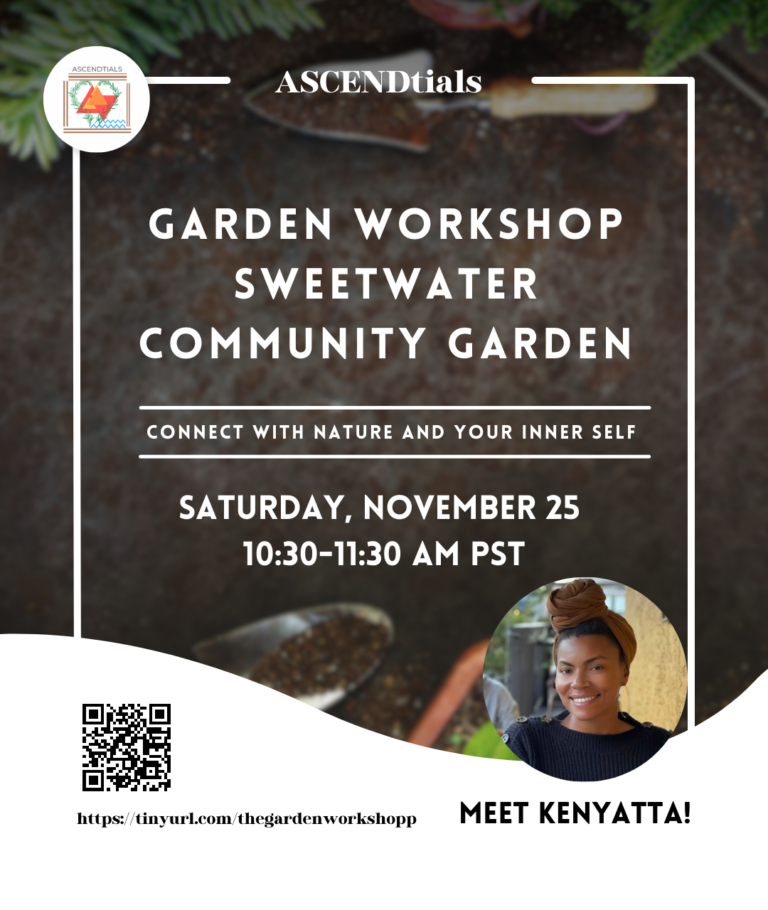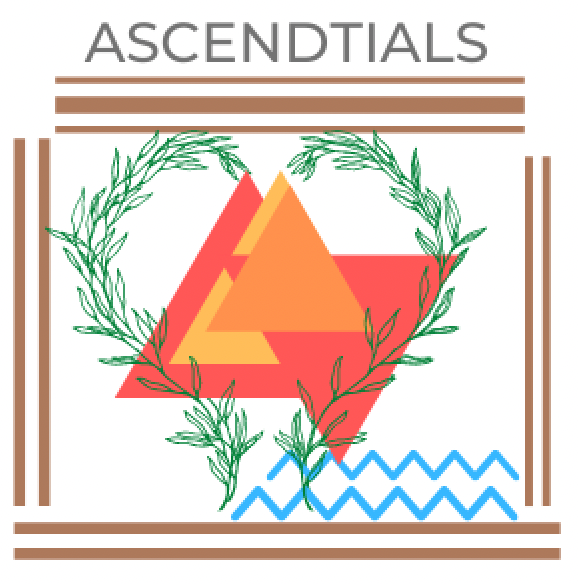Sweetwater Community Garden
About ASCENDtials
ASCENDtials is a 501(c)(3) non-profit organization that aims to empower BIPOC communities through workshops and conferences, teaching BIPOC individuals methods to combat oppressive structures. Recently, ASCENDtials has developed a Kemetic Yoga program focused on alleviating stress and depression symptoms among BIPOC participants. Recognizing the significance of this program, ASCENDtials has expanded further into the wellness sector by initiating gardening projects.
Currently, we operate a successful community garden in Bonita and aspire to establish one in our neighborhood, specifically in Pantoja Park.
Volunteerism Efforts
Recent wildfires raging throughout southern California indicate that climate change is a real occurring force within many coastal U.S. communities. ASCENDtials seeks to respond to these changes by supporting the community with essential tools that encourage building relationships, increasing knowledge on growing our own food, and providing preventative responses to the growing concerns over food insecurity. As a community, we require access to a community garden for residents to have as a backup. No one should be limited to supermarket produce, but have community resources to support your health needs. This means that we must work together to change our situation through collaboration with local populations and neighbors.
ASCENDtials aims to fund the project through local grants and online donations. ASCENDtials uses student and community volunteers to fertilize the soil and plant all crops within an 800 square-foot area, in Sweetwater’s Community Garden.
Through this gardening initiative, ASCENDtials desires to educate and highlight these crops and gardening techniques to students (and San Diego’s residents), given America’s challenges with climate change, supply chain bottlenecks, and depleting freshwater sources and soil issues. By bringing together students of all ages, we can learn more about nature and ways to sustain and protect land in our own communities. This is necessary if we are to prepare ourselves for these issues that won’t go away without changing our awareness and responses to them. To sustain the garden, we will ask members to pay a small monthly membership fee of $5 to maintain the grounds and preserve the garden’s operational costs.
Upcoming Gardening Workshops
Date: November 25, 2023
Time: 10:30 am PST
Topic: The secrets to a thriving Fall garden!
Learn which plants flourish in the fall, when to sow your seeds, and how to effectively manage those garden pests. We’ll also cover essential tips on garden maintenance, soil care, and seasonal transitions to ensure the garden remains vibrant throughout the season. This workshop will equip you with all you need for a bountiful fall harvest!
Gardening Rules & Things to Bring
Welcome to ASCENDtials garden! Thank you for your decision to grow with us! We hope your experience is enjoyable and enriching. Our garden offers many opportunities for fun events and activities alongside growing the foods needed to sustain a healthy, productive life! Join us in creating these moments together! If you’d like to become a member or learn more about what we are doing, upcoming workshops, please check out our garden project page for more details.
Here’s a site that has a list of 5 useful items to bring every time you come to the garden. Besides the following items, you can bring your own water, gloves, hat, and sunscreen. Remember to always enjoy being one with the soil!
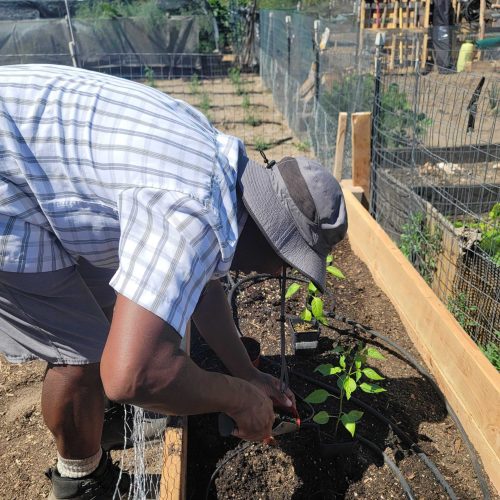
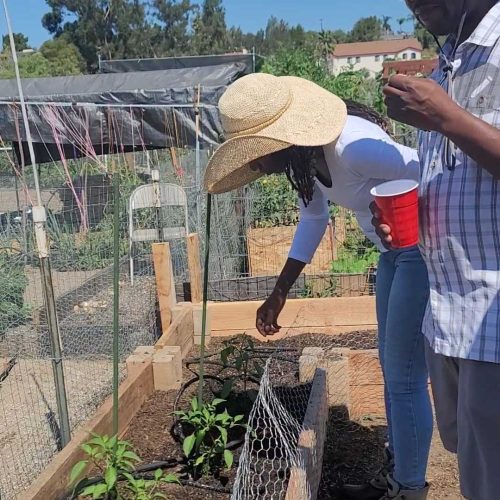
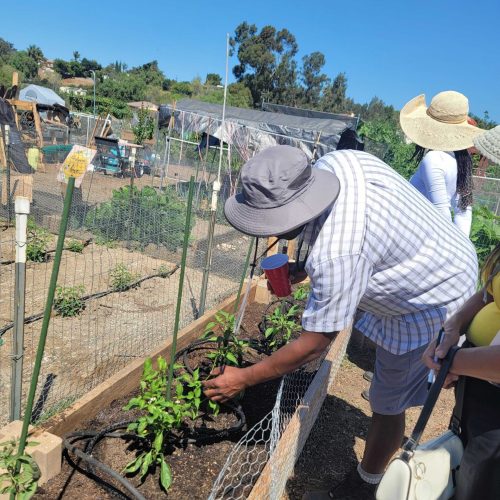
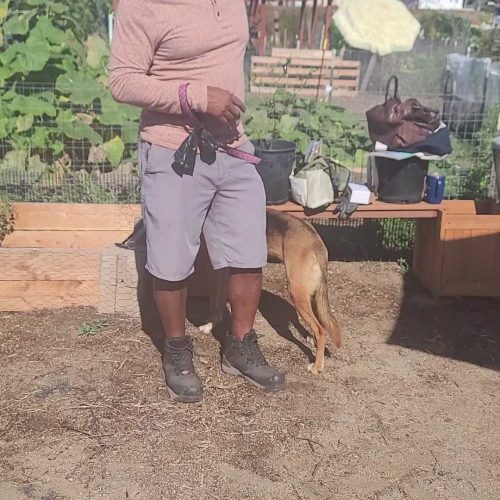
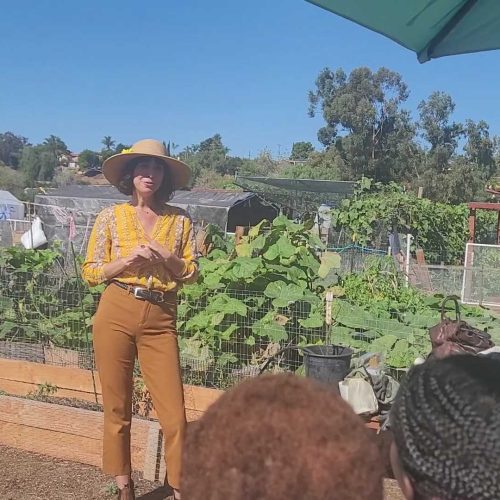
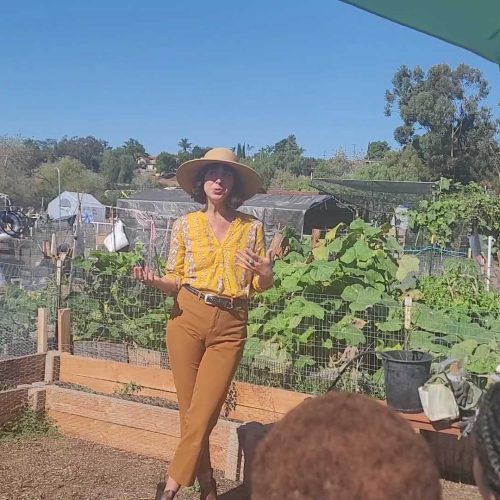
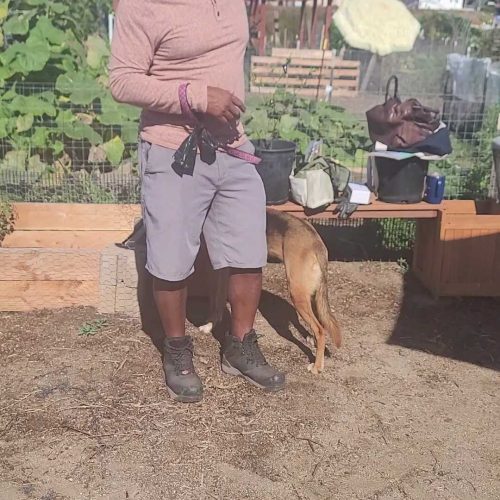
Sarina shed light on about the limited utility of grass when not utilized for recreational purposes. She emphasized its inability to effectively absorb water or contribute to the enhancement of healthy soil, revealing how it often serves as a symbolic representation of Colonial wealth.
Our Gardening Initiative
ASCENDtials aims to plant drought-resistant, and native maize corn, peppers, beans, and squash. The types of plants chosen originate from ancient civilizations like the Aztecs, Cherokee, and other Native American and Central American tribes. We also aim to plant a variety of medicinal plants and grains, that are more powerful and underutilized in our American diets, but are well-known with indigenous civilizations to bring about higher-level thinking and optimal health. Students will be exposed to the benefits of these Superfoods, to heal, and irradicate toxins and trauma within the body. Some of the plants we grow below are highlighted.
Maize Corn
ASCENDtials plants four species of maize corn: Rainbow corn, Blue Hopi corn, Aztec corn, and Oaxacan Green Dent corn. Historically, Maize corn varieties were the choice of crop for ancient Hopi, Aztec, Cherokee, and Zapotec tribes because they could weather extreme temperatures and droughts.
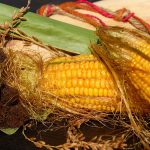
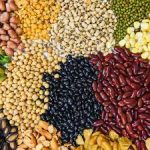
Beans
ASCENDtials plants Tepani beans, Lima beans, Cherokee Trail of Tears beans, and Arikara Dry Yellow Beans. ASCENDtials chose to plant these types of beans to demonstrate the inventiveness of Native American tribes and to highlight lesser-known Native American bean varieties. For instance, the Arikara Dry Yellow Beans were cultivated by Arikara and Mandan Tribes within the Missouri region, while the Cherokee Tribes planted Cherokee Trail of Tears beans after they were forced to move to Oklahoma.
Peppers
ASCENDtials plants varieties of Chiltepin Peppers and Ordono peppers which originate from Mexico, and Jupiter Red Bell peppers and Criola de Cochine Peppers from Central America. ASCENDtials intends to accentuate the contributions Central American tribes have made toward current U.S. farming methods by planting Central American pepper varieties.


Squash
ASCENDtials plants four Native American varieties of Squash: Candy Roaster, Mandan Summer, Arikara, and Seminole Pumpkin. ASCENDtials is eager to highlight these Midwestern and Floridan tribes’ crops to the average person.s
Something To Take Notes With
- Measurements or plans for building something
- To-Do List
Something to take Photos and Videos with
- Plants and progress you have made to post on social media
- Parts of your garden that need changes you can mark up later
- Plants that are diseased or that you need to identify to take to a nursery or garden center for expert advice
Something to Drink and Eat
- Water / Tea
- Healthy Snacks
Something to Listen to
- Meditative Music
- Powerful, Energetic Music
- Talk Radio / Podcasts / Audiobooks
Something to tell you when to stop Working
- Wristwatch
- Smartphone (Alarm)
- Someone to call for you
Venue Information
5354 Sweetwater Road, Bonita, CA 91902
Phone: (619) 562-0096Saturday, November 25th, 2023 @ 10:30-11:30 AM PST
Meet our Garden Lead-Jason Taylor

I live in Eastlake, just a few miles from the Sweetwater Community Gardens. I’ve been helping in the garden since I can remember and have a passion for gardening, seed saving, growing food and sharing my passion with friends and family. I look forward to building out new features, teaching workshops and meeting everyone down at the community garden.
Community involvement End-of-Season Harvest Competition
Student volunteers will participate in a gardening competition. The competition will recognize volunteers’ abilities and showcase the literal fruits of their labor while educating them. The competition provides an element of fun and a platform to come together, compete and exchange knowledge, and advance their level of horticultural skills.
There will be several categories based on the different species grown, and volunteers can select which category they would like to compete in.
Judges will also make their decisions based on the taste, size, and weight of each participant’s harvest. Judges will award points, 10 points being the maximum.
Examples of possible submissions are included below.
| Type of Plant | Heaviest | Largest | Tastiest |
| Maize Corn | |||
| Beans | |||
| Peppers | |||
| Squash |
